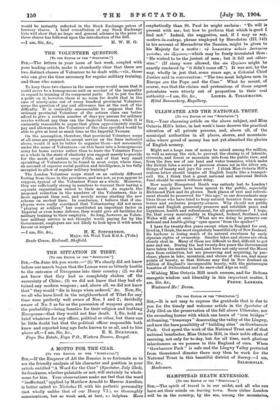THE VOLUNTEER QUESTION. [To THE EDITOR OP THE " SPECTATOR."]
SIR,—The letters in your issue of last week, coupled with your leading article, make it abundantly clear that there are two distinct classes of Volunteer to be dealt with,—viz., those who can give the time necessary for regular military training, and those who cannot.
To keep these two classes in the same corps would mean that it could never be a homogeneous unit on account of the inequality in regard to training of its component parts. Not to put too fine a point on it, however, there is no room for doubt that in the case of ninety-nine out of every hundred provincial Volunteer corps the question of pay and allowance lies at the root of the difficulty. It is eminently unreasonable to suppose that the ordinary provincial Volunteer of the artisan class can better afford to give a certain number of days per annum for military service without pay than can the Imperial Yeoman ; while it is eminently reasonable to argue that given approximately similar pay and allowances, the Volunteer of the class specified would be able to give at least as much time as the Imperial Yeoman.
On the assumption, therefore,-that provincial Volunteer corps of all arms are prepared to accept service on the lines indicated above, would it not be better to organise them—not necessarily under the name of Volunteers—on this basis into a homogeneous army for home service rather than to leave the Volunteer Force as a whole in the state of elasticity you suggest merely to provide
for the needs of certain corps and of that very small sprinkling of Volunteers to be found in most corps, whose time, on account of superior social position and intelligence, is too fully occupied to allow of regular military training ?
The London Volunteer corps stand on an entirely different footing from those in the provinces, and are not, as you appear to suppose, typical of the Volunteer Force as a whole. Moreover, they are sufficiently strong in numbers to warrant their having a separate organisation suited to their needs. As regards the proposed reduction in the numbers of the Volunteers, this is more apparent than real, and • merely means starting the new scheme on modest lines. In conclusion, I believe that if em- ployers were really convinced that Volunteering did not mean 'playing at soldiers," but constituted an important factor in Imperial or even home defence, they would give all facilities for military training to their employes. So long, however, as Volun- teer military service is not thought worth paying for by the Government, employers are not likely to look upon it with much favour or respect.
Bents Green, Ecclesall, Sheffield.






































 Previous page
Previous page